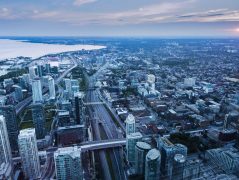
Toronto
Contents
1 Introduction2 Data and Facts3 Administration4 Economy5 Business Environment6 Infrastructure7 Technology8 Social wellness and human resource9 ReferencesIntroduction
Toronto, the capital of Ontario, Canada, is settled on the northwest shore of Lake Ontario. Toronto lies in South-eastern Canada covering 630 square kilometers. The city is located on a broad sloping plateau featuring various river valleys. In 2020 the UN World Urbanization Prospects estimated the city’s population to be 6,196,731 people. The city of Toronto witnesses a blend of diverse races and cultures. Toronto is the most crowded and the largest city in the whole of Canada.
Toronto is also known as the financial and commercial capital of the country. The easy access to Great Lakes and St. Lawrence Seaway has connected the city to the most important trade centers and has emerged Toronto as an international trading hub. The CBRE Research 2019 Scoring Tech Talent within North America positioned Toronto 3rd out of 50 tech talent markets in the continent.
Data and Facts
- In the year 2018, the unemployment rate was 6.4%, and the Gross Domestic Product was recorded as $158.7 billion
- The census of 2016 recorded the multicultural characteristics of the city- 12.9% of the total population was English, 7.6% East Indian, 9.7% Irish, 12.0% Chinese, 9.5% Scottish, 5.5% Filipino, 3.8% Polish, 4.6% German and 4.5% French.
- Toronto welcomes almost 1000 new immigrants annually. There are over 240 ethnic groups using more than 180 languages to communicate. Approximately 51% of the population if foreign-based.
- Toronto is the 4th largest city and third-largest tech sector in North America. Furthermore, it’s the second-largest financial center of the continent.
Administration
In 1998 the city was governed by a mayor and 44 councilors, with each elected councilor supervising one of the wards. The city was fragmented into 6 community councils and then branched into 44 wards. In the year 2003, these six councils were rearranged as 4 and each was allotted 10 to 12 wards. Further in 2018, the number of wards was reduced to 25 keeping in mind the federal and provincial electoral ridings.
Economy
Canada’s financial capital Toronto is growing as a global financial center. In the year 2017, the GDP recorded an increase of 3.3 percent. In 2018, according to Statistics Canada publish 96,000 net jobs were generated in the city and the unemployment rate was recorded as 6.4%. And recently Forbes magazine included the city into the top ten list of World’s Most Economically Powerful Cities’. The city’s large-scale economy appeals to the investors.
- Toronto operates the prime stock exchange in Canada and is the second-largest financial service center in North America. In the whole of America, the highest number of financial services company headquarters is found in Toronto.
- Along with this, the concentration of private IT Companies makes it stand in the third position in the whole of North America.
- Toronto has evolved as a leading industrial center because of Ontario’s abundant resources including hydroelectricity, raw material, employed for manufacturing 50% of the country’s products.
- The operation of 80,000 industrial plants in the city makes it the manufacturing capital of the country.
- The Oxford Economics and the Conference Board of Canada have estimated that the city’s economy will flourish in 2019 and 2020 by over 2% yearly.
Business Environment
The welcoming and encouraging business environment of Toronto supports the budding of Start-ups. The start-up friendly ecosystem is a result of the various business incubators and accelerators offering variegated services and strategic partnerships. The growth of start-ups has been noticed majorly in the sectors of biotechnology, technology, music, design, food manufacturing, and fashion. In 2019 the Start-up genome, stated in their Global start-up ecosystem report that Toronto’s startup ecosystem is globally positioned in the top 20 active start-up scenarios and is the largest in the country.
Infrastructure
The rapid investments coming in the city for improving the public infrastructure has helped Toronto to maintain its economic stability. The city has planned some significant improvements in the infrastructure. The water revitalization of Toronto is in progress and the largest urban renewal project. The Unites Station, the busiest multi-modal passenger transportation hub in the country has witnessed an essential redevelopment. And the game-changer, regent park revitalization project converting the social housing development land into self-sufficient mixed-income and multi-use community is under development as well. it is claimed that by the end of 2020 the 49 stories CIBS Square 1 will be the home of the novel Microsoft headquarters.
Technology
The government of Toronto has specified that for the smart city implies a city that is effectively connected digitally. The government aims at providing a platform where residents can easily access the City services and participate in the local government. The city has already started to transform into a smart city. The new program King Street Pilot, helps the city in polishing the transit speed, reliability and capacity. One of the most efficient projects is the Smart Traffic Signals that adjust the traffic signals according to the real-time traffic patterns.
DineSafe map application helps to navigate through 15000 restaurants all over the city and the My Water Toronto app helps the residents to asses their water uses per day, week, month and year. The diverse economy of Toronto has developed a few novel hybrid industries such as med-tech, food tech, and green tech. Along with this the private sector also contributes to technological developments. For example, in 2017 Uber set up a research team to develop driverless car technology in Toronto.
Social wellness and human resource
The education sector in Toronto not only provides education to the children but also offers the city’s largest employment opportunities. There are 1400 educational institutions in the city. Under the Ontario Health Insurance Plan, Toronto offers free health care services to its residents.
References
https://torontoglobal.ca/our-industries/technology
https://blog.brainstation.io/2019-the-toronto-tech-sector-makes-it-big/
https://www.blogto.com/tech/2019/11/toronto-ranked-top-city-tech-canada/
https://en.wikipedia.org/wiki/Economy_of_Toronto
https://www.thecanadianencyclopedia.ca/en/article/toronto
https://www.toronto.ca/business-economy/invest-in-toronto/start-up-here/
https://torontoglobal.ca/A-Competitive-Edge/We-are-business-friendly
http://www.city-data.com/world-cities/Toronto-Economy.html
https://www.toronto.ca/city-government/data-research-maps/
https://www.bbc.com/news/technology-50234146
https://worldpopulationreview.com/world-cities/toronto-population/
https://www.toronto.ca/city-government/data-research-maps/toronto-at-a-glance/
https://www.livingin-canada.com/living-in-toronto.html
https://www.britannica.com/place/Toronto/Economy#ref16162
https://www.ctvnews.ca/canada/toronto-is-the-sixth-safest-city-in-the-world-report-1.4573536
https://en.wikipedia.org/wiki/Toronto#Infrastructure
https://www.findbusinesses4sale.com/businesses-for-sale-in-toronto-ontario/
 Metricsbeta
Metricsbeta